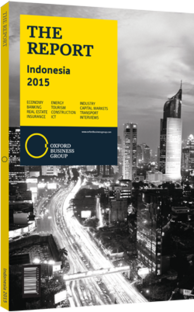Altering Bandung's landscape
The capital of West Java, Bandung, is cool. Not only does it sit at a high altitude and have low average temperatures – 700 metres above sea level and 23°C, respectively – it is also a centre for education, culture and technological innovation. Some 60% of Bandung’s 2.4m people are younger than 40 and they are the main drivers of the city’s so-called “creative economy”, as entrepreneurs in design, clothing, distribution outlets and, of course, music and film.
Mission Possible
Bandung’s mayor, Ridwan Kamil, is literally the architect of the city’s popularity. An award-winning architect, he was elected as an independent candidate in 2013, and his governing style reflects his independent spirit. In order to side step obstacles that have made change difficult to achieve in the past, such as corrupt officials and bureaucracy, the mayor has assembled a group of friends and supporters dubbed the “Mission Impossible Team”. Under his administration, the desolate spaces in the city were transformed into meet-up spots, urban farms and festival areas. There’s even a happiness index. When he took the reins of the city over from a mayor accused of corruption, he called Bandung a “city in ruins” – but it was a city he intended to make over within three years.
Now, the city is thriving economically. Between 2008 and 2012, Bandung’s economy grew at an average of 8.5%. During the same period, the national average was 5.8% and West Java’s was 5.86%. Ridwan said at the US-Indonesia Investment Summit in November 2014 that Bandung’s economic growth has reached 9% and its per capita income doubled in the past five years. It has a city budget of approximately $10.8bn.
Fighting Gridlock
In common with Jakarta and Surabaya, one of Bandung’s major challenges is its lack of adequate transportation architecture, causing heavily congested roads. Most of the city’s residents use cars, motorbikes and buses to get around, and gridlock is common. The mayor has strategies to fix this, too. “Even though I am an architect, I am not trying to create an architectural legacy, but a public transport legacy, which is more practical,” he said in an April 2014 interview. The mayor’s plans to improve transport and connectivity in the city include an integrated cable car system that will carry passengers to and from the city’s hills, a light-rail system and a pedestrian skywalk above the city streets. The system is expected to cost $600m and with limited funding available, the mayor is looking at various financing sources. One option is to mirror the success of the transportation systems in Hong Kong and Singapore, where ticket prices are subsidised by the companies operating the system, which in turn rent out retail and commercial space in stations. Ridwan has also called out to foreign investors for assistance, citing the possibility for public-private partnerships.
Technopolis
Leveraging technology forms an integral part of Ridwan’s vision for the city’s future. He has said he wants Bandung to be a wired city. “We have 5000 hotspots installed and our dream is to have 40,000.” This increased connectivity is key to the innovation-led economic growth upon which he is staking his administration’s reputation. The mayor has already implemented e-governance programmes to enhance the effectiveness of public services. Similar to the system operating in Jakarta, Bandung’s is available online, on social media and on mobile applications, and the measures include an obligation for all local government departments to maintain and monitor Twitter accounts in order to be more responsive to residents’ needs. However, the mayor’s most ambitious scheme is a plan to develop a “Technopolis”, a 1000-ha town in East Bandung. As a technological development centre, it will complement the work and research performed at Bandung Institute of Technology, as well as Bandung’s approximately 80 other universities. Estimated completion dates have not been publicised, but in April 2015 Huawei announced it had signed a cooperation agreement with PINS Indonesia, a subsidiary of Telkom Indonesia, to provide infrastructure for the smart city. When it is built, Technopolis will source and feed the city’s entrepreneurial and creative industries and tourism sector.
You have reached the limit of premium articles you can view for free.
Choose from the options below to purchase print or digital editions of our Reports. You can also purchase a website subscription giving you unlimited access to all of our Reports online for 12 months.
If you have already purchased this Report or have a website subscription, please login to continue.

